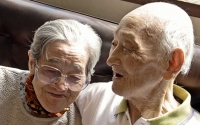Introduction to Living with Dementia | Dementia Awareness



In this session, we will describe what dementia is, how common it is and what it is like to live with its common symptoms, both for the person and their family. We will describe the signs that can be mistaken for dementia and what we can do to reduce our risk of getting dementia. We will describe how we can help people affected by dementia to live as well as possible.
This session addresses learning outcomes in subject 1 of the Dementia Training Standards Framework [1](read details regarding the reference) and is designed to support the Dementia Action Alliance Dementia Statements [2](read details regarding the reference).
Learning Objectives
By the end of this session you will be able to:
- Describe the number of people living with different types of dementia in the UK and how we can lessen the risk of developing dementia
- Explain what it is like to live with the common symptoms of dementia for the person and their family; and conditions that can be mistaken for dementia
- Describe the many ways we can enable people to live as well as possible with dementia
In this session, we will describe what dementia is and how common it is, and what it is like to live with the symptoms of dementia, both for the person and their family. We will consider the many ways that we can enable people affected by dementia to live as well as possible.
This session has been mapped to the Dementia Training Standards Framework [1] and is designed to support the Dementia Action Alliance Dementia Statements [2]
Murna is a Professor in Dementia Studies at the Centre for Applied Dementia Studies at the University of Bradford. Her research interests focus on improving quality of life and quality of care for people with dementia and their families. Recent research includes approaches to improving transitions in dementia care; improving health care for nursing home residents; promoting independence for people living with dementia in the community; and the effectiveness of the University's practice development methodology, Dementia Care Mapping, in implementing person-centred care in care homes.
Murna has published on a range of topics including the perspective of the person with dementia, early diagnosis, long term care, end of life and transitions in dementia care. She is co-editor of the textbook 'Excellence in dementia care: Research into practice' and is series editor of the University of Bradford Jessica Kingsley Good Practice Guides on Dementia Care. She is an ambassador for the Alzheimer's Society, serves on the Research Advisory Council of the Alzheimer's Society, is an adviser to Alzheimer Europe, and is a member of the National Institute for Health Research Portfolio Development Group for the Dementia and Neurodegenerative Diseases Research Network (DeNDRoN). She was recently awarded an outstanding achievement award by the British Society of Gerontololgy.


Ana is a Dementia Care Consultant and Trainer in person-centred care at the Centre for Applied Dementia Studies at the University of Bradford. She is module leader in the MSc Advanced Dementia Studies for the modules: Advancing Practice Skills and Research Methods.
Ana's research interests are focused on supporting the well-being of care assistants who work with people living with dementia in care homes. She is currently involved in research projects related to falls and vision and hearing loss in care homes for older people.


- End of Life Care | Advance care planning | Advance...
- Posted By eIntegrity Healthcare e-Learning
- Posted Date: 2025-01-13
- Location:Online
- This session focuses on principles of good practice which underpin the appropriate and valid use of Advance Decisions to Refuse Treatment (ADRT), within an end of life care context. This session was reviewed by Fiona Rawlinson and Sarah Hanrott and last u
- End of Life Care | Advance care planning | Advance...
- Posted By eIntegrity Healthcare e-Learning
- Posted Date: 2025-01-13
- Location:Online
- This session builds on the principles of advance decisions to refuse treatment. It focuses on the practical steps involved in supporting patients requesting the development of an advance decision. This session was reviewed by Fiona Rawlinson and Sarah Han
- End of Life Care | Advance care planning | ACP in ...
- Posted By eIntegrity Healthcare e-Learning
- Posted Date: 2025-01-13
- Location:Online
- This session describes how the Preferred Priorities for Care tool may be used to facilitate advance care planning. This session was reviewed by Fiona Rawlinson and Sarah Hanrott, and last updated in February 2023.
- End of Life Care | Advance care planning | ACP and...
- Posted By eIntegrity Healthcare e-Learning
- Posted Date: 2025-01-12
- Location:Online
- This session provides an overview of the concept of illness trajectories and its influence on the advance care planning (ACP) process in end of life care. This session was reviewed by Fiona Rawlinson and Sarah Hanrott and last updated in February 2023.
- Acquired Brain Injury course
- Posted By eIntegrity Healthcare e-Learning
- Posted Date: 2025-01-12
- Location:Online
- This session will outline the causes and effects of acquired brain injury (ABI) in childhood. It wil...






